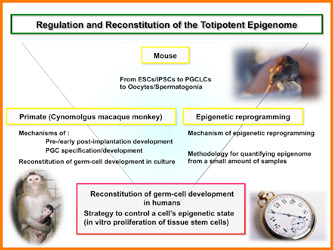

Totipotency refers to the ability of a cell to differentiate into all cell lineages and to form individuals. In mammals including humans, only zygotes and their immediate descendants (blastomeres in 2-cell and 4-cell embryos) bear totipotency. During subsequent development, although embryonic cells lose totipotency, primordial germ cells (PGCs), the precursors both for oocytes and spermatozoa, initiate a program for re-acquiring totipotency. During germ cell development, epigenetic reprogramming occurs for the acquisition of totipotency. Understanding of the genetic and epigenetic mechanisms for the acquisition of totipotency in the germ line is of key importance in biomedical science and in regenerative medicine.
Using the mouse and a non-human primate (Cynomolgus macaque monkey) as model organisms, this project explores the genetic and epigenetic regulation in germ cells, early embryos, and stem cells, aiming for the regulation and reconstitution in vitro of germ cell development and ultimately, totipotency. The knowledge obtained by this project will provide a foundation for the clarification of the mechanisms for infertility, congenital diseases, and some genetic disorders as well as for the development of the method for stem/progenitor cell proliferation.
News
- 2013.03.12
- Lecture and Seminar updated
- 2013.03.12
- Lecture and Seminar updated
- 2013.03.12
- Project website is opened.


